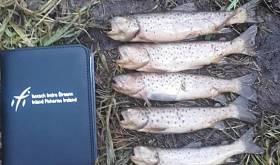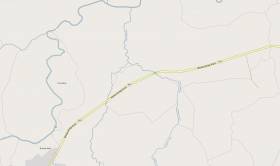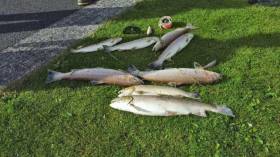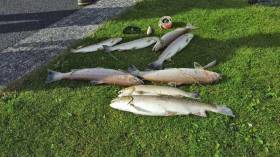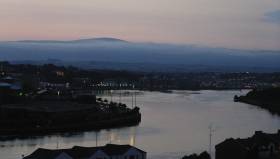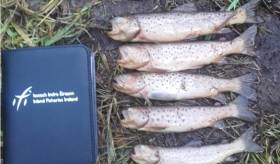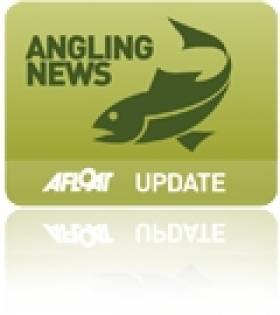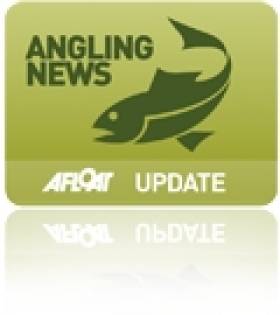Displaying items by tag: fish kill
Galway Landowner Convicted Over River Pollution Incident
#Angling - A landowner has been convicted of a breach to the Water Pollution Act in Glenamaddy, Co Galway that resulted in a major fish kill.
At a sitting of Tuam District Court, Michael Conneally of Boyounagh, Glenamaddy pleaded guilty to permitting silage effluent to enter the Yellow River, a tributary of the Clare River in Co Galway, on 15 June 2016.
David Harrington, senior fisheries environmental officer with Inland Fisheries Ireland (IFI), gave evidence of tracing the source of the fish kill back to a pipe originating from a silage pit on Conneally’s land.
The pollution incident resulted in damage to fish stock in the Yellow River, which is an important spawning tributary for salmon and trout with the absence of aquatic life noted for a considerable distance downstream, as previously reported on Afloat.ie.
Conneally fully co-operated with officers from IFI and sought to remedy the incident without delay. However, the polluting matter had already impacted the river.
Judge Mary Devins convicted Conneally and fined him €750 with three months to pay, as well as laboratory expenses of €464.94 and legal costs of €600.
IFI chief executive Dr Ciaran Byrne said: “We would appeal to farmers for continued vigilance to help protect our waterways from agricultural pollution.
“At this time of year, silage is in full swing and silage effluent can be a highly toxic substance when it gets into rivers, starving the fish and invertebrate life of oxygen. This incident on the Clare River highlights the large impact one leak can have on our fisheries resource.”
The Clare River is the largest tributary of Lough Corrib, and sees thousands of salmon and trout run the river to spawn every year. It provides a valuable angling facility for local and tourist anglers in the West of Ireland.
There are six different angling clubs along the river who have made significant investment in recent years to help improve the spawning and nursery habitat for salmon and trout. The clubs rely on the responsible environmental stewardship of local farmers to maintain the Clare River as a key angling resource.
Angling in Ireland currently contributes €836 million to the Irish economy annually, supporting upwards of 11,000 jobs.
Major Fish Kill On Important Salmon & Trout Waterway Near Lough Neagh
#FiskKill - Heavy rain over the weekend slowed the investigation into a fish kill on a tributary of an important salmon and trout river for Northern Ireland.
As BBC News reports, a slurry discharge in the Altagoan River near Magherafelt caused the death of a “significant” number of fish over a two-mile stretch, as discovered by local anglers late last week.
The Altagoan flows into the Moyola River, described by the Moyola Angling Club as “one of Northern Ireland’s premier salmon and dollaghan [Lough Neagh trout] rivers”.
Local fishermen say the situation is “completely devastaing” to the popular game fishery, which has had much enhancement work over the last decade.
The news comes just week after a cracked pipe led to a chemical spill and subsequent fish kill in a Co Down river, amid concerns over spikes in pollution and poaching across Northern Ireland.
Cracked Pipe Led To Fish Kill On Co Down River
#FishKill - The fish kill on the Annsborough River in Co Down last weekend was caused by a chemical leak from a cracked pipe, accoridng to BBC News.
And NI Water has offered to restock the salmon and sea trout stream, one popular with local angling enthusiasts, days after the incident at its water treatment plant in the area.
As previously reported on Afloat.ie, some 1,600 fish were killed when the river was polluted by what’s since been confirmed as a polyelectrolyte used in processing water treatment byproducts.
"The severity of this incident is very unusual for our company. We truly regret the outcome and the number of fish that have been killed,” said NI Water in a statement.
BBC News has more on the story HERE.
Major Fish Kill On Co Down River After Chemical Spill
#FishKill - Accidental discharge from a water treatment works is to blame for a major fish kill incident on a Co Down river at the weekend, as the Belfast Telegraph reports.
Angling enthusiasts have expressed dismay over the deaths of more than 1,600 fish on a tributary of the Annsborough River that flows into Dundrum Bay near Newcastle, after making the grim discovery on Saturday 8 October.
The Northern Ireland Environment Agency is currently investigating the incident, which NI Water has admitted was caused by an accidental discharge of chemicals into a river known locally for salmon and sea trout.
The Belfast Telegraph has more on the story HERE.
Earlier today Afloat.ie reported on concerns among Northern Irish anglers over spikes in pollution and poaching on the country’s waterways.
NI Anglers Concerned By Rise In Pollution & Poaching
#Angling - Pollution and poaching are a growing concern for anglers in the Carlingford and Lough Foyle areas, as Derek Evans reports in his latest Angling Notes for The Irish Times.
New figures from the Loughs Agency reveal a significant raise in pollution, the worst incident of which occurred this past August when hundreds of salmon fry were lost in a fish kill on the River Faughan, according to the Derry Journal.
In addition, the Loughs Agency report informed NI Environment Minister Michelle McIlveen of almost double the number of fishing gear seizures this year compared to 2015, as well as a sharp rise in court actions.
The Irish Times has more on the story HERE.
Irish Water Prosecuted Over Midlands River Fish Kill
#FishKill - Inland Fisheries Ireland (IFI) has successfully prosecuted Irish Water over a chemical discharge on 18 August last year that causing a significant fish kill on a tributary of the Tullamore River.
At a sitting of Portlaoise District Court on Friday 15 July, Judge Catherine Staines heard evidence from Michael Fitzsimons, a senior fisheries environmental officer with IFI, that following a pollution report received from Irish Water, IFI carried out a detailed investigation on the Clodiagh River.
Over 3,000 fish mortalities were estimated over a 4km stretch of the river, consisting predominantly of trout along with other species such as salmon, lamprey, minnow and stoneloach.
The fish kill was as a direct result of a chemical discharge from an accident at the Irish Water plant in Clonsalee, Co Laois. Irish Water entered a guilty plea.
Judge Staines directed Irish Water to pay IFI’s legal costs of €5,016 and to cover the full cost of the rehabilitation works to be carried out downstream of the incident area. A development plan will be formulated by IFI in the coming weeks.
The judge did not impose a fine on the basis that it would be the Irish taxpayer paying for the incident. She also instructed Irish Water to carry out a full review of its Waste Water Treatment Plants (WWTP) and provide a report to her by 21st July 2017.
Judge Staines stated that she did not want to see an incident like this happening again.
“This was a serious pollution incident which will take a considerable number of years for the river to recover," said Amanda Mooney, Shannon River Basin District director with IFI.
"I am pleased with the outcome of the case and the provision for vital rehabilitation works to assist fish stocks to recover naturally.”
Judge Staines adjourned the case until 21 July 2017 to allow sufficient time for the rehabilitation works and WWTP review report to be concluded.
In other news, submissions are open for the consultation on plans to phase out fish farming at three of four IFI facilities it currently operates around Ireland.
As previously reported on Afloat.ie, operations in Roscrea, Co Tipperary; Cullion in Mullingar, Co Westmeath and Lough Allua in West Cork are affected by the restructuring plan.
Facilities at Cong in Co Mayo will be retained or research and stocking purposes, but rainbow and brown trout will no longer be farmed for sale.
Submissions should be made in writing before 5pm on Friday 19 August to [email protected] or Fish Farm Consultation, IFI, 3044 Lake Drive, Citywest Business Campus, Dublin D24 Y265.
Loughrea Firm Convicted Over Cavan Fish Kill
#FishKill - A Loughrea business was convicted over pollution discharge into the Laragh River in Co Cavan, causing a major fish kill between 12-14 August last year.
In addition to the fine of €4,000, Glan Agua was directed to pay legal costs and expenses to Inland Fisheries Ireland (IFI) to a total of €63,352.94 including €59,262.94 towards appropriate mitigation measures.
Glan Agua was prosecuted by IFI following investigations into a fish kill on the Laragh River after the discharge of chorine from Knockataggert drinking water treatment plant.
At a sitting of the District Court held at Cavan Courthouse on Thursday 23 June, Judge Denis McLoughlin heard evidence from Ailish Keane, senior fisheries environmental officer with IFI, that IFI carried out detailed investigations on the Laragh River over a number of days after a tip-off from the public.
It was established that more than 3,000 fish – including brown trout, minnow, stone loach, eel and stickleback – had been killed over a distance of 6km from a surface water outfall at the Clifferna Bridge to just below Drumgur Bridge.
Giving details of sampling and analysis undertaken, Keane confirmed the discharge from the surface water pipeline to the Laragh River was characterised by seriously elevated levels of sodium hypochlorite, otherwise known as chlorine.
Keane said that on the morning of 13 August, she visited the Knockataggert drinking water treatment plant at Clifferna, Co Cavan. She noted that there was a serious fish kill and that there had been a chorine on the premises that had subsequently discharged into a surface water pipe that later flows directly into the Laragh River.
On instruction, staff from Glan Agua immediately completed the clean-up of the discharge and prevented all remaining effluent residues from entering the watercourse. Glan Agua staff were found to be fully co-operative at all times during the investigation.
The legal representative for Glan Agua, who told Judge Mcloughlin their client pleaded guilty in the matter, noted his client’s pristine record prior to this incident. He said that a director of the company was present in court and the employee who presided over the plant on the date the incident took place had been severely reprimanded.
Extensive evidence was given by Keane regarding the extent of investigations undertaken as a result of this significant pollution incident. The court was told it would take years for the river to regenerate itself to the condition it was in previous to the incident. Judge McLoughlin stated he could not stress the seriousness of the situation enough prior to handing down the sentence.
IFI has a confidential hotline number to enable members of the general public to report incidents – 1890 34 74 24 or 1890 FISH 24. This phone line is designed to encourage the reporting of incidents of illegal fishing, water pollution and invasive species.
Major Fish Kill on Spawning Tributary of Clare River, Galway
Inland Fisheries Ireland is currently investigating a major fish kill on the Yellow River, a tributary of the Sinking River near Dunmore, Co. Galway, which flows into the Clare River. The stream in question is an important spawning and nursery habitat for young trout and salmon.
Staff were notified of the fish kill late last week and an immediate inspection revealed large numbers of dead fish in the river over almost one kilometre downstream. Dead crayfish were also found. Staff traced the source of the pollution to silage effluent leaking from a silage pit on a nearby farm. Samples and photographs were taken, and a prosecution will be taken in light of the severe nature of the pollution.
Inland Fisheries Ireland is again appealing to farmers to exercise vigilance when harvesting and making silage at this time of year. Water levels are low in many rivers, so any pollution has a much greater impact. It is vital to prevent any leakage from silage pits, and to ensure slurry is only spread in suitable conditions and well away from streams and drains.
Commenting on the incident, Dr Ciaran Byrne, CEO of Inland Fisheries Ireland said “Protection of fish stocks is vital to maintaining an extremely valuable natural resource for the benefit of local and tourist anglers alike.
“Recreational angling in Ireland is worth over €836 million to the economy and supports over 11,000 jobs. Salmon and trout, in particular, depend on good water quality to survive, and IFI is committed to protecting water quality in our rivers and lakes. Members of the public can assist fisheries staff by reporting all instances of illegal fishing or pollution to IFI’s confidential 24 Hour hotline number at 1890 347 424".
Fish Kill Investigated At Carrigadrohid Reservoir
#FishKill - Inland Fisheries Ireland (IFI) and Cork County Council are investigating fish mortalities at Carrigadrohid Reservoir in Co Cork following the discovery of small numbers of bream and rudd.
As of 14 June no cause has been identified, but water and fish samples were being collected for further analysis at the popular coarse angling spot.
IFI has a 24-hour confidential hotline number to enable members of the public to report incidents at 1890 34 74 24 or 1890 FISH 24.
This phone line is designed to encourage the reporting of incidents of illegal fishing, water pollution and invasive species. For more information visit www.fisheriesireland.ie.
Inland Fisheries Ireland Monitors River Loobagh Pollution
#angling – Inland Fisheries Ireland (IFI) is today continuing to monitor an incident of pollution on the River Loobagh in Limerick, which resulted in an extensive fish kill earlier this week.
On 4th August 2014, IFI received a report from local anglers in Kilmallock that the River Loobagh at Riversfield Bridge, near the Limerick County Council water treatment plant, was in a polluted condition and dead fish could be seen. The River Loobagh is an important fishery, primarily for brown trout, but also for salmon which seemed to be returning to the river in small numbers.
A discharge of effluent into the River Loobagh was located, and the source was traced to an over ground steel slurry tank on a nearby farm. Once IFI contacted the farm owner, works immediately proceeded to prevent further discharge and the flow of effluent was intercepted at a number of locations, effectively preventing further discharge.
A series of samples were taken which have been sent for analysis. Pending the results of the analysis a decision will be made by IFI concerning a prosecution and any other legal actions that may be warranted.
IFI staff carried out a visual inspection of the River Loobagh to determine the extent of the fish kill. Further to this, approximately 555 fish were observed to be dead, with an additional 95 fish found by the local angling club. The majority of the fish were brown trout, as well as a small number of juvenile salmon.
IFI is continuing to work with both the farmer and Limerick County Council to ensure that no further pollution can arise and that all appropriate remedial action is taken. IFI will continue to monitor the situation and ensure that any pollution risk is removed.
Inland Fisheries Ireland (IFI) has a confidential hotline number to enable members of the general public to report incidents - 1890 34 74 24 or 1890 FISH 24. This phone line is designed to encourage the reporting of incidents of illegal fishing, water pollution and invasive species.



























